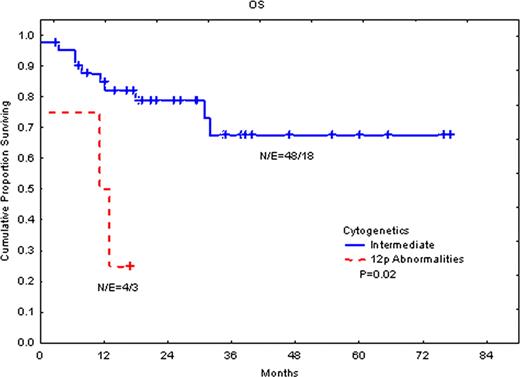Abstract
Abstract 4464
Alterations of the short arm of chromosome 12, most often resulting in loss of chromosomal material, are a recurrent feature in myeloid malignancies and occur in about 5 % of cytogenetically abnormal AML. Chromosomal abnormalities of 12p in AML have been reported to be associated with a non-favorable outcome. However, it is unclear how dismal the outcome is, as AML with 12p abnormalities is variably included in the intermediate or poor prognosis groups. Moreover, the role of allogeneic hematopoietic stem cell transplantation (HSCT) on outcome of patients with 12p abnormalities is not known. We investigated whether HSCT can improve the poor survival of patients with 12p abnormalities.
Bone marrow conventional cytogenetic and FISH data from 110 adult AML patients was reviewed and patients were divided into three cytogenetic risk groups according to the European LeukemiaNet reporting system while separating the patients with 12p aberrations into one independent fourth group. We also compared outcome of the 12p group with to the intermediate group alone or after combining intermediate with favorable, since there was no significant difference between the favorable and the intermediate groups. The AML cohort included 62 (56%) patients treated in their first remission (CR1) while most non-CR1 AML patients were treated with HSCT in CR2. The median age of all patients was 25 years (range: 14–58).
Patients with 12p abnormalities were 4 (4%). Patients with 12p abnormalities had a significantly shorter overall survival (OS) (P=0.03) and event-free survival (EFS) (P=0.04). Their outcome was similar to the adverse-risk cytogenetic group, and survival was significantly shorter than in the intermediate group (P=0.02). The poor outcome was significant even when only patients treated with HSCT in first remission were considered. All four patients with 12p abnormalities were treated with HSCT in CR1.
Although the number is small, this data suggests that 12p chromosomal changes in AML are significant adverse abnormalities, not different from complex cytogenetics, and treatment with HSCT does not change this dismal outcome. This also suggests that for patients with 12p abnormalities, alternative therapeutic approaches should be considered.
No relevant conflicts of interest to declare.
Author notes
Asterisk with author names denotes non-ASH members.


This feature is available to Subscribers Only
Sign In or Create an Account Close Modal